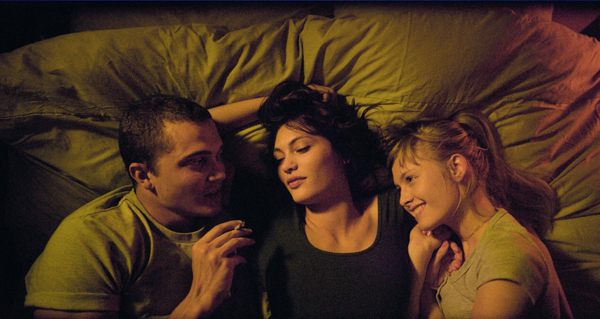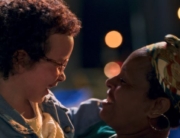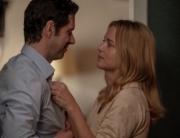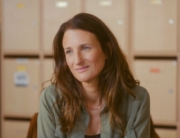Only a few films could pack a 2,300-seat theater at a 12:30 Thursday morning screening as did Gaspar Noé’s 3-D orgiastic opus Love when it premiered at the Cannes Film Festival. Sight unseen, it had already gained notoriety for the director’s declared intention to add emotion to explicit sex within a love story. Well, in one way, the film lived up to the hype. As Blazing Saddles’s Lily Von Shtupp would say, “Oh, it’s twue. It’s twue. It’s twue. It’s twue.” (In more ways than one.)
Yes, Noé goes all the way with his young cast, placing them in private situations and making them public. He makes no pretense about his intentions. Eschewing foreplay, the movie begins with a bang, so to speak: Murphy (Karl Glusman) and Electra (Aomi Muyock) intertwined atop bedsheets, mutually masturbating in one three-minute shot.
Noé takes sex out of the harsh lighting and run-of-the-mill poses of online hookup sites and websites and gives it the deluxe treatment, bringing to mind 1970s art-house soft-core fests of, say, Walerian Borowcyk’s The Beast and Immortal Tales—and not just in the personal grooming. Anyone would look good naked under Noé’s soft, chiaroscuro lighting. Unlike the director’s earlier films, sex is portrayed far from the violence of Irréversible or the sinister (Enter the Void). As if to keep thing classy, the first sex scene is set to Satie’s Gnossienne No. 3 (a score that is so overused in French films that it has been a cliché for the last 10 years or so).
The effect of the widescreen 3-D is almost tactile, as though Noé is daring the audience to reach out and touch, raising a question: In this day and age of 24/7 access to sexual content, what is there that will draw viewers to see this film publicly? Not too much, really. It’s in the attempt to chart the bloom and bust of a young romance where the film turns flaccid.
A game-and-giving American living in Paris, Murphy looks back in chronological disorder on his time with Electra, which ended several years back. Now he’s trapped in a perfunctory relationship, one he feels tricked into. His memories are rekindled one New Year’s Day morning when he receives a phone call from Electra’s mother. Her daughter has long been missing and has he heard from her?
The mother assumes the worst. She reveals to Murphy that her daughter is suicidal and a drug addict. Her name should be a tip-off—no surprise, Electra has a daddy complex, too. However, still waters run deep, indeed. As the mystery woman in question, Muyock, making her film debut, has an easygoing charm—more Leslie Caron than Andrey Tatou—but she gives off no indication she’s the volatile cokehead Murphy believes her to be, though there’s a scene where Electra introduces him to sex on opium. Glusman, on the other hand, has been a New York-based actor on the rise. He was part of the Broadway ensemble in Golden Boy a few years ago and was a subject of a New York Times profile on how young male actors, often shirtless, stay fit. (He dons much, much less here.)
Partly because of the disconnect between what the couple say they feel and what viewers see, the film drags in the second hour, as the audience waits for the next sex set piece. The film is built around the bedroom; everything mostly feels like padding. Though both actors are appealing and good-looking in an unintimidating way, their characters comes off as a little bland and their trajectory pedestrian. The film succeeds in capturing the physical passion, but the emotions are barely one-dimensional and aren’t helped by the banal, buzzkill dialogue, including the hoary “What doesn’t kill you can make you stronger.”
Noé’s intention to blend actual sex into a narrative has been done before, of course: Shortbus, Stranger by the Lake, and the two-part Nymphomaniac, to name a few. It’s not a short list. Michael Winterbottom’s 9 Songs (2004) follows a similar tune as Love (a man looks back on a lost love) but dragged at 69 minutes long. Again, the central relationship was more banal than brazen, making the sex scenes lively in comparison. But Love is visually strong; 9 Songs was shot on digital before the technical advances of that format’s resolution.
As it turns out, Murphy is an aspiring filmmaker, with the same goal as Noé. His wants to make movies with “blood, sperm, and tears,” to combine sex with ardor. Love at least has one of the three.







Leave A Comment